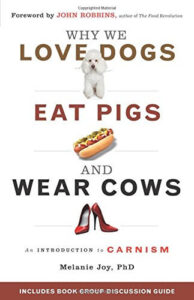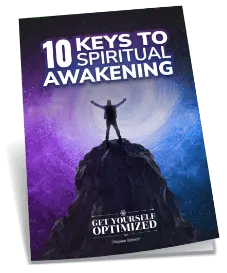This article was originally published under Huff Post.
With the advent of new scientific research on the existence of animal “consciousness”, it seems apropos to consider our mindset around which animals we raise for slaughter and which we raise for companionship.
This mindset has a name: carnism.
Anyone who has ever loved a dog or a cat will tell you that their pet exhibits conscious and deliberate behaviors, even a level of understanding, above and beyond basic animal instinct. Heretofore, this would have been considered anthropomorphism, reflecting our own human consciousness on the animals we cherish. But now the neurological scientific community has declared that non-human animals are indeed capable of emotional and cognitive states similar to humans. This includes our beloved pets, of course, but it also includes cows, pigs, birds, even rats. So what is the mindset that allows us to compartmentalize, to view some animals for loving and others for eating?

Chances are you’ve never heard the word carnism before, but you will. It’s entering the common vernacular, thanks in large part to the advocacy work of Dr. Melanie Joy. Dr. Joy is the author of the book Why We Love Dogs, Eat Pigs, and Wear Cows: An Introduction to Carnism.
So what is carnism, exactly? Dr. Joy defines it as “the invisible belief system, or ideology, that conditions us to eat certain animals.” It’s basically the opposite of veganism. She continues: “We tend to think of vegans (and vegetarians) as the only ones who bring their beliefs to the dinner table. But we all do it. If eating animals is not necessary for survival, then it is a choice — and choices always stem from beliefs.” We may not think consciously about these beliefs as we are eating our steak dinner, but they are present nonetheless, operating in the background. In fact, we probably prefer that they remain in the background. Do we really want to think about the origin of the steak in front of us and the implications involved?
Dr. Joy further describes carnism as a system that “allows humane people to participate in inhumane practices without fully realizing what they are doing. It teaches us how not to feel.” And it is, in part, the very invisibility of modern-day animal agriculture that allows us to dissociate so completely from the reality of our experience. We know that dogs and cows, pigs and cats are all sentient beings, and yet we treat them so very differently because this pervasive, invisible system allows us, indeed even tells us, to do so.
Although she firmly believes in veganism, Melanie Joy isn’t interested in preaching about it. Instead, she wants to engage in meaningful dialogue about the entrenched ideology that allows people to shut their minds to the reality of what it means to be a meat eater and to ignore the cruelty inherent in animal agriculture. We are told from a young age that this is the natural order of things and so we see it as true. But Dr. Joy is challenging us to rethink this order. She wants to raise awareness on this deep-seated ideology, to bring it out into the open where it can no longer be ignored. To this end, she and her dedicated team of volunteers have launched the Carnism Awareness & Action Network (CAAN). CAAN seeks not to coerce us into veganism, but to empower us to make truly free choices. “Carnism blocks our awareness and without awareness, there is no free choice” says Joy.
And CAAN is as much about educating vegans as it is about educating non-vegans. When vegans see that there is an invisible belief system at work, that carnism has pervaded our society so thoroughly that most people don’t see meat eating as a choice, these vegans have much more compassion for non-vegans. They no longer see meat eaters as unethical or lacking in empathy, and can thus participate in a more constructive, objective conversation. Because until all of us, vegans and non-vegans alike, recognize that there is an underlying ideology, we can’t even begin to have a thoughtful dialogue. Dr. Melanie Joy doesn’t want to just change your mind, she wants to open your eyes.







